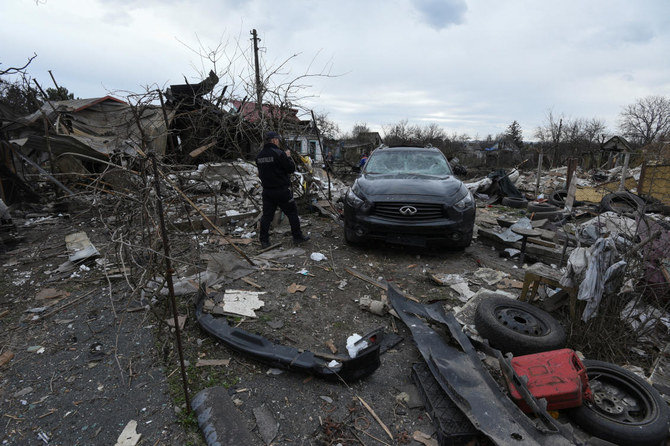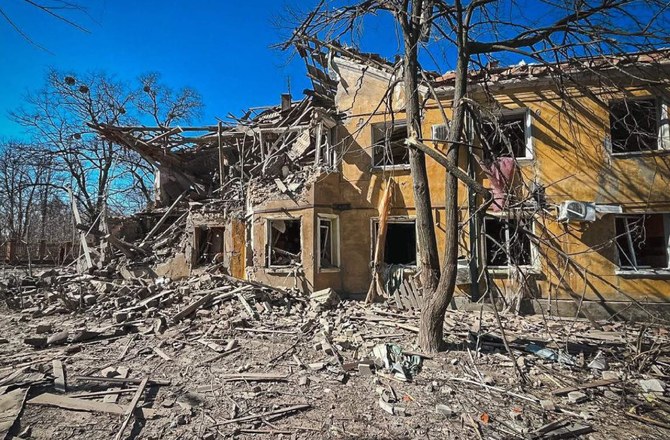KYIV: Moscow launched a large-scale attack on Ukraine’s energy infrastructure Friday, with a mass barrage of 99 drones and missiles hitting regions across the country, Ukraine’s armed forces said.
Air raid warnings rang out across the nation, with 10 Ukrainian regions coming under fire, the country’s interior minister, Ihor Klymenko, said.
Russia has escalated its attacks on Ukraine in recent days, launching several missile barrages on the capital, Kyiv, and hitting energy infrastructure across the country in apparent retaliation for recent Ukrainian aerial attacks on the Russian border region of Belgorod. Such sporadic attacks, however, have been common throughout the war.
Large-scale blackouts have already affected Ukraine’s eastern city of Kharkiv, where 700,000 people lost power after the city’s thermal power plant was hit in a drone and missile attack on March 22.
In the winter of 2022-23, Russia targeted Ukraine’s energy infrastructure, causing frequent blackouts. Many in Ukraine and the West expected that Russia might repeat that strategy this winter, but Russia instead initially focused its strikes on Ukraine’s defense industries.
Ukraine’s state-owned grid operator, Ukrenergo, said Friday’s attack deliberately targeted thermal and hydroelectric power plants across central and western regions.
In a statement, Ukrainian President Volodymyr Zelensky confirmed that Ukraine’s Kaniv and Dniester hydroelectric power stations had come under attack and accused Moscow of risking an ecological disaster similar to the destruction of the Kakhovka Dam in June 2023.
Opinion
This section contains relevant reference points, placed in (Opinion field)
Both Kyiv and Moscow have accused the other of destroying the dam, but the various Russian allegations — that it was hit by a missile or taken down by explosives — fail to account for a blast so strong that it registered on seismic monitors in the region.
The dam’s destruction led to deadly flooding, endangered crops, threatened drinking water supplies for thousands and unleashed an environmental catastrophe.
Zelensky also warned that other countries would be threatened if the dams were hit. Dnister Hydroelectric station, located near the city of Novodnistrovsk, Ukraine, is approximately 15 kilometers (9 miles) from the border with Moldova.
“Not only is Ukraine under threat, but Moldova too,” Zelensky said. “The water will not stop in front of the border.”
DTEK, Ukraine’s largest private electricity operator, also said that three of its thermal power plants had been damaged in the attacks. It announced emergency power shutdowns in the city of Odesa, leaving several neighborhoods without power.
Five people, including a 5-year-old girl, were wounded during the attack in Ukraine’s Dnipropetrovsk region, said local Gov. Serhii Lysak.
He later said that another man had been killed and one more injured in a separate drone attack Friday.
Elsewhere, Ukrainian police said rescuers had recovered the body of a 66-year-old woman from a building in the Mykolaiv region that was hit by a Russian missile Thursday night.
The bombardment in the west of Ukraine caused the Polish Armed Forces to scramble its own aircraft, the country’s operational command said on social media.
Last week, Warsaw demanded an explanation from Moscow after one of its missiles strayed briefly into Polish airspace during a major missile attack on Ukraine, prompting the NATO member to activate F-16 fighter jets.
Romania’s defense ministry also said on Friday that an investigation has been launched after fragments that appeared to be from a drone were identified on its territory Thursday evening in an agricultural area of Braila county, close to the border with Ukraine.
It did not provide additional details, although since the start of Russia’s full-scale invasion of neighboring Ukraine, NATO member Romania has confirmed drone fragments on its territory on several occasions.
Belgorod also came under fire Friday, Russia’s Ministry of Defense wrote on social media. It said that it shot down 15 Ukrainian shells, with falling debris damaging a number of residential buildings. No casualties were reported.
Regional Gov. Vyacheslav Gladkov later said on social media that one man had died as the result of a separate drone attack which struck an apartment block.































